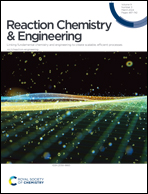A machine learning-enabled process optimization of ultra-fast flow chemistry with multiple reaction metrics†
Abstract
Discovering the optimum process parameters of ultra-fast reactions, such as lithium–halogen exchange reactions, is typically achieved by time and resource inefficient methods including one factor at a time optimization (OFAT) or classical factorial design of experiments (DoE). Herein, we demonstrate the development of a machine learning workflow coupled with a flow chemistry platform for the optimization of the reaction conditions of a lithium–halogen exchange reaction. Flow chemistry platform allowed us to precisely control the process parameters (temperature, residence time and stoichiometry) and enabled robust and reliable data collection to train a machine learning algorithm. A Bayesian multi-objective optimization algorithm TSEMO (Thompson sampling efficient multi-objective optimization) was used to optimize the process parameters and to build process knowledge for different optimization campaigns with different mixing intensifications (capillary reactor vs. microchip reactor). The algorithm successfully identified a set of optimal conditions corresponding the trade-off between yield and impurity in different optimization campaigns. Furthermore, the optimization results and Gaussian process (GP) surrogate models within TSEMO were further analyzed to infer the operating regime of the system for different mixing intensifications (mixing controlled vs. reaction-controlled regime). The machine learning workflow has proven to be robust and data efficient, revealing rich information about the reaction studied compared to single-objective, OFAT and DoE approaches.

- This article is part of the themed collections: In Celebration of Klavs Jensen’s 70th Birthday and Machine Learning and Artificial Intelligence: A cross-journal collection


 Please wait while we load your content...
Please wait while we load your content...